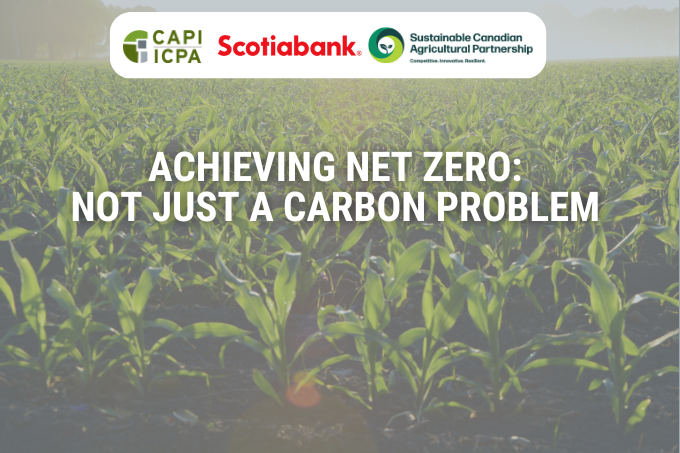Achieving net zero: Not just a carbon problem

CAPI releases new report: Getting to zero: The complexities of achieving net zero in Canadian agriculture
(Ottawa, ON – July 29, 2024) As Canada sets out to achieve net zero CO2 emissions by 2050, the agri-food sector is under pressure to maximize environmental efficiencies while maintaining profitability. But with such a diverse sector how will these targets be met while accounting for economic, environmental, and regional complexities? The Canadian Agri-Food Policy Institute (CAPI) has recently published this report to address how these complexities should be accounted for in policy framework for the agri-food sector to meet net zero emissions.
There is more to meeting net-zero emissions than the simple solution of reducing carbon emissions.
“Many of the key issues that make this a complex problem stem from the fact that each level of the supply chain faces variability. Unlike other industries, agriculture cannot simply set a static annual target” says CAPI research associate Elisabeta Lika. “At the farm level, the current greenhouse gas (GHG) tools lack accuracy and specificity, they should be “fit-for-purpose” to meet the needs of diverse farm operations across Canada.”
Additionally, there are inefficiencies in data collection for aggregate GHG intensity data at the post-farm gate level making it difficult to achieve consistencies across the food value chain.
For strategies to be effective, they must demonstrate economic benefits to stakeholders, reflect actual farm operations, and be adaptive to account for changing conditions.
For instance, it may be challenging to get farmers to adopt technologies or practices that promote emission reductions without proper policy or financial incentives to support their adoption. Eliminating livestock farming from the system may be a solution to reducing methane emissions but it is not practical from a production standpoint. Other considerations for policy recommendations are how to maximize production efficiencies while still reducing emissions, how to account for food waste and maintain food availability, understanding the limits of soil carbon sequestration and land use intensification, and finally how these policies will impact international trade.
“The transition to net-zero agriculture isn’t just an environmental challenge – it’s an economic and social one too,” adds Lika. “We must ensure that as we push for sustainable practices, we’re not putting unfair pressure on our farmers and rural communities. The transition to net-zero needs to work for everyone.”
Lika adds “By tackling this challenge head-on, Canadian agriculture can set the standard for climate-smart farming worldwide. We have the innovation and expertise to make it happen.”
The report recommends that at a high-level, governments ensure the full spectrum of agri-food complexities are considered in policy framework, policies are region-specific rather than “one size fits all”, and policy framework must be flexible to the changing technology and scientific landscape of the agri-food sector. For Canada to become a global leader in sustainable agriculture, there must be collaboration between multiple parties through open, inclusive dialogue.
Getting to zero: The complexities of achieving net zero in Canadian agriculture was developed by CAPI researchers as part of a group of three reports by CAPI and the Centre for Agri-Food Benchmarking to discuss the challenges of meeting net-zero emissions targets in the agri-food sector. From education to action: A review of greenhouse gas tools in pursuit of net-zero agriculture by CAPI reviews the GHG estimation tools available, the role these tools can play in achieving net-zero, and the challenges impacting tool adoption. Greenhouse gas intensity measurement in transportation and food processing by the Centre for Agri-Food Benchmarking highlights the lack of aggregate GHG intensity data at the post-farm gate and the challenges that exist in making these calculations. Both reports touch on the need for standardized approaches at both the farm gate and post-farm gate level to accurately collect GHG data. These are complex challenges that need diverse expertise to ensure effective solutions and sustainable production now and into the future.
